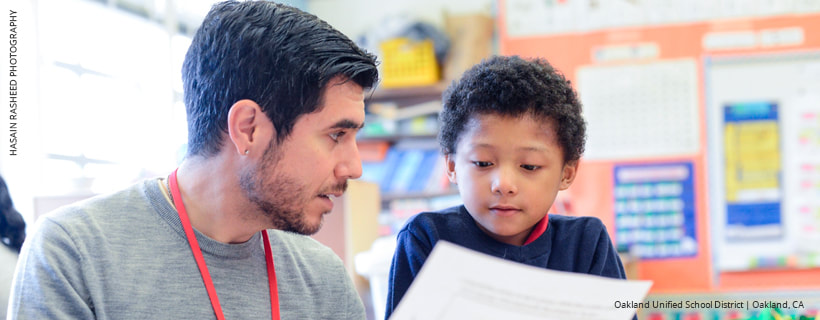 This essay and the accompanying webinar are part of a series that supplement Embracing a New Normal: Toward a More Liberatory Approach to Family Engagement by Karen L. Mapp and Eyal Bergman, a report commissioned by Carnegie Corporation of New York that explores the dynamics and barriers that stand in the way of effective family-school partnerships and outlines how to reach a more liberatory, solidarity-driven, and equity-focused family engagement practice that supports educational excellence for all children. At Family Engagement Lab, inequality in family engagement drives our dual focus on empowering historically underserved families to support student learning and modeling inclusive and equitable family engagement for educators. Through our signature tool, FASTalk, we address both objectives. With FASTalk, teachers share engaging, at-home activities by text message in each family’s home language to reinforce classroom learning and curriculum. Features such as opt-out enrollment for families, professional translations, and automated messages aligned with the academic calendar ensure that all families are warmly invited to engage in their child’s learning.
 I’m writing with an urgent and important message to Family Engagement Lab’s partners regarding the rise in hate crimes targeting Asian-Americans. The murders of eight people in Atlanta, including six Asian women, punctuates the sharp increase in violent attacks across the country. Asian-Americans across the country are living with a daily fear for our loved ones and for ourselves. Asian-American families are OUR families, Asian-American children are OUR students, and Asian-American educators are OUR teachers. One out of 10 FASTalk students identify as Asian, and Chinese is the third most commonly spoken language by our parents, after English and Spanish. Anti-Asian racism is affecting all of us profoundly. Many of you have spoken with me about wanting to build stronger and supportive relationships with Asian-American families in your communities. I’m grateful for that because complicity is not an option. A recent youth-led study revealed a quarter of Asian-American young adults have been the targets of racism in the past year. In nearly half of cases an adult was present, but only seldom intervened. Whether there are five Asian-American families in your community or 50,000, there is no more important time than the present to act when the safety and sense of belonging of anyone in our communities is threatened. As we approach Asian-American Pacific Islander Heritage Month in May, it is an opportune time to take action in support of our Asian-American community members. Below is a list of resources for your schools and educators to build strength in your school communities to foster safety and belonging for Asian-American students, families, and colleagues during these challenging times. Please join us in building safe, supportive, and inclusive communities for Asian-Americans. Sincerely, Vidya Sundaram Co-founder and CEO The Research on Supporting EL StudentsWhile ELs are the most rapidly growing student subgroup, representing nearly 10% of public school students and speaking more than 400 different languages and dialects, over 30 states do not require EL training for general classroom teachers beyond what is required federally. Indeed, the research on teacher preparedness and self-efficacy for teaching ELs paints a bleak picture. Despite a strong likelihood of having an EL student in their classroom, teachers are often without the necessary training and support to meet the needs of a heterogeneous EL student population with unique educational needs related to developing both English language skills and building subject area knowledge. Accordingly, national data reveal many ELs have unmet academic potential, as evidenced by academic assessment results comparing the achievement of ELs to their non-EL peers. How Teachers and Families Can Partner to Support EL Students’ SuccessStrategies for educators to move from “barriers to family involvement” to “leveraging strengths through family engagement”  A few years ago Family Engagement Lab facilitated a gathering of parents to discuss parental involvement in education at their elementary school. During the discussion, the group moderator pulled us aside to let us know that a parent was there because her child had been retained a grade and she did not know why. A few weeks later at a similar gathering, we were pulled aside by the moderator again, this time to tell us about a parent whose child was receiving decent grades throughout the year but scored poorly on the state test and now needed summer remediation. In both cases, the teachers and parents did not share a common language. Language differences often come in between the two most important figures in a child’s life—parents and teachers, and limit their ability to communicate early to identify problem areas and partner together to support struggling learners. The consequences are severe. English Learners (also referred to as English language Learners, ELs, or ELLs) make up 9.5% of public school students, and 16% of kindergarteners nationally, yet proportionately far fewer achieve academic proficiency compared to their English-speaking peers. For example, national data reveal that fewer ELs achieve proficiency compared to non-ELs in mathematics (14% versus 43%) and Reading (9% versus 40%). Lost learning during the COVID-19 pandemic is expected to reduce academic progress even further. The long-lasting negative impacts are well-documented and range from lower high school completion rates to lower earning potential and underemployment.  The violent attempts to disrupt our democratic processes at our US Capitol on January 6 were disturbing and traumatic. The Capitol building is a symbol of our representative government, meant to uphold our cherished values of equality, liberty and justice for all. Yet the insurrection, including the symbols held up during the desecration of the US Capitol, explicit encouragement from a President fueling false conspiracies about the election, and delayed deployment of the National Guard from the Executive Office, was deeply about the racism that courses through this country’s past and present. As educators fighting for equity, it is our responsibility to acknowledge this truth: while our nation’s promise may deem all to be equal, we have yet to achieve this promise for all of us. To live up to the promise that our democracy’s laws and institutions hold, we all must do our part to face our past while rebuilding a more just future for ourselves, and for our children. We appreciate the efforts of the following organizations who have created resources for teachers and families to support honest conversations with children. |
Categories
All
Archives
July 2024
|
|
DONATE
PayPal |
548 Market Street #42210 San Francisco, CA 94104
© 2023, Family Engagement Lab | Privacy Policy | Terms of Use
© 2023, Family Engagement Lab | Privacy Policy | Terms of Use

